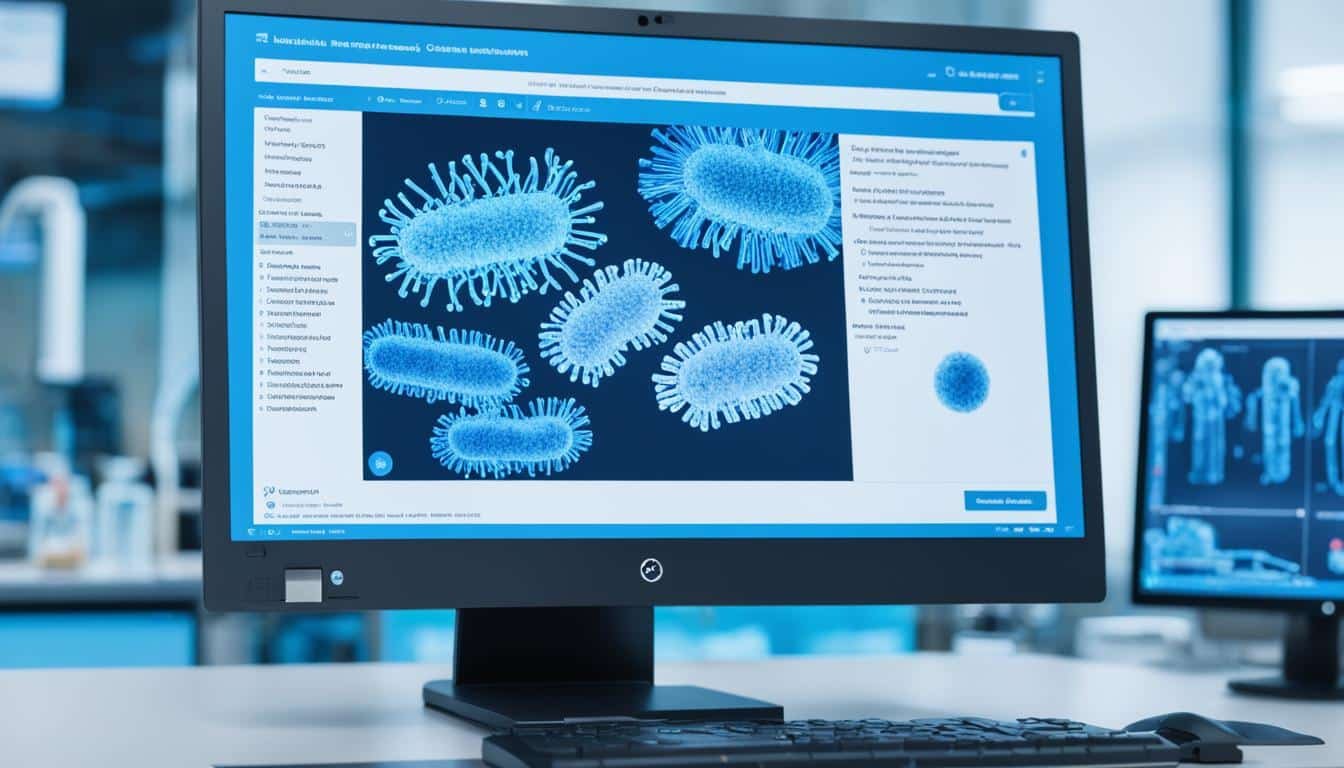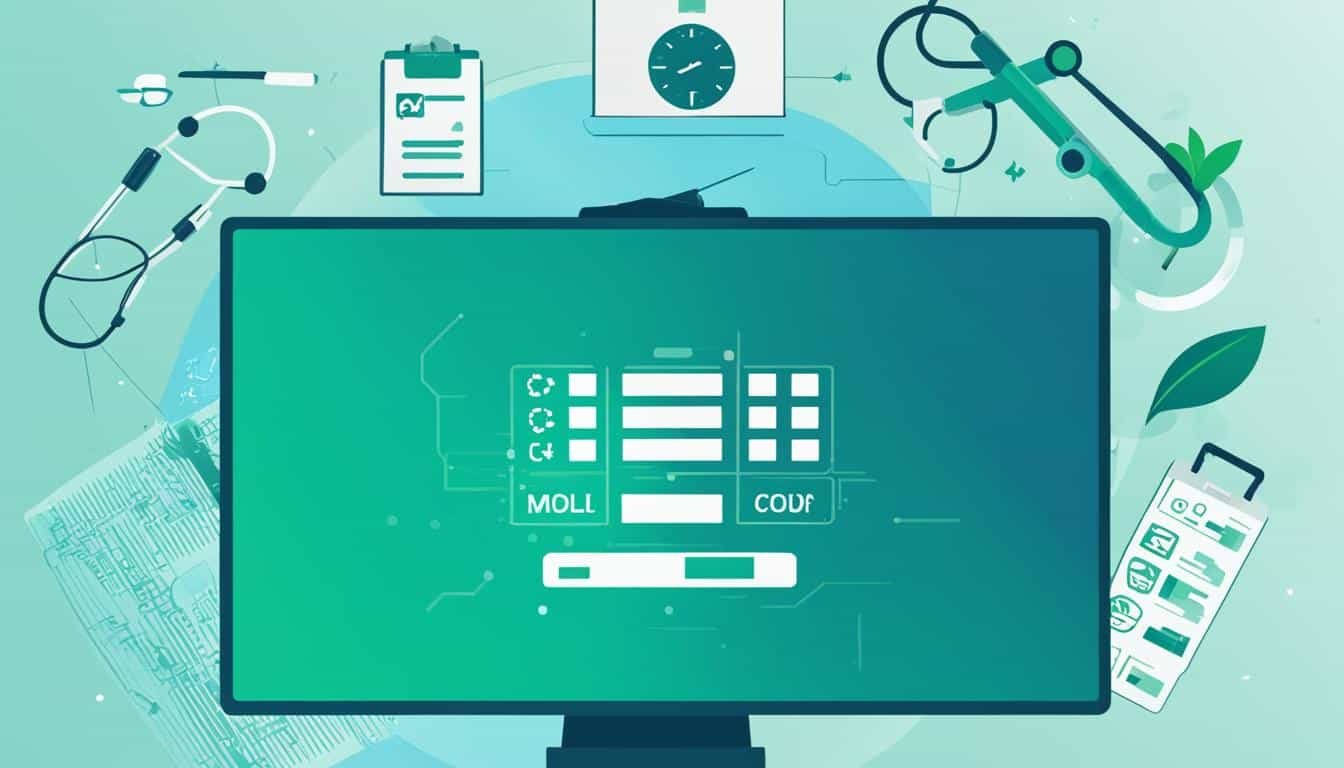Microbiology Online Course : Microbiology is the study of microscopic organisms and their structures, functions, uses, and modes of existence. It is critical for understanding the role microorganisms play in our everyday lives. Microbiology courses can provide quality training for aspiring scientists and health professionals. There is a growing demand for Microbiologists in various industries, including healthcare, agriculture, and medicine.
Key Takeaways:
- Microbiology is the study of microscopic organisms and their functions.
- Microbiology courses offer training for scientists and health professionals.
- Growing demand exists for Microbiologists in healthcare, agriculture, and medicine industries.
- Online microbiology courses provide a convenient and flexible way to learn.
- Microbiology plays a crucial role in understanding microorganisms in our daily lives.
Why Take an Online Microbiology Course?
Online microbiology courses offer a convenient and flexible way to enhance your knowledge or learn new microbiology skills. Whether you’re an individual seeking personal growth or a corporate team looking to upskill, these courses are designed to accommodate learners from all backgrounds and levels of expertise.
Microbiology is a vast field that encompasses the study of various microorganisms, including bacteria, viruses, fungi, and parasites. Online courses cover a wide range of topics within microbiology, providing comprehensive training on the uses of microbiology in various fields, such as healthcare, agriculture, and environmental studies.
By taking an online microbiology course, you can:
- Expand your understanding of microorganisms and their impact on daily life
- Gain valuable knowledge and skills applicable to a wide range of industries
- Learn at your own pace and on your own schedule
- Access high-quality course materials and resources
- Interact with expert instructors and collaborate with other learners
Whether you’re interested in pursuing a career in microbiology or simply want to explore this fascinating field, an online microbiology course can provide you with the necessary foundation and expertise.
“Online microbiology courses offer the flexibility and convenience needed for professionals and students to acquire and advance their microbiology skills. These courses cater to learners who prefer the convenience of online education while still receiving comprehensive training in the field of microbiology.”
To give you an idea of the topics covered in an online microbiology course, here is a table showcasing some key areas of study:
| Topics Covered |
|---|
| Bacteria |
| Viruses |
| Fungi |
| Parasites |
| Uses of microbiology in healthcare |
| Uses of microbiology in agriculture |
| Uses of microbiology in environmental studies |
The knowledge and skills you gain from an online microbiology course can open doors to various career opportunities in fields such as healthcare, research, pharmaceuticals, and more. Moreover, having a solid understanding of microbiology can provide a competitive advantage in these industries.
So why wait? Start your journey into the fascinating world of microbiology by enrolling in an online microbiology course today!
Benefits of Taking a Microbiology Course Online
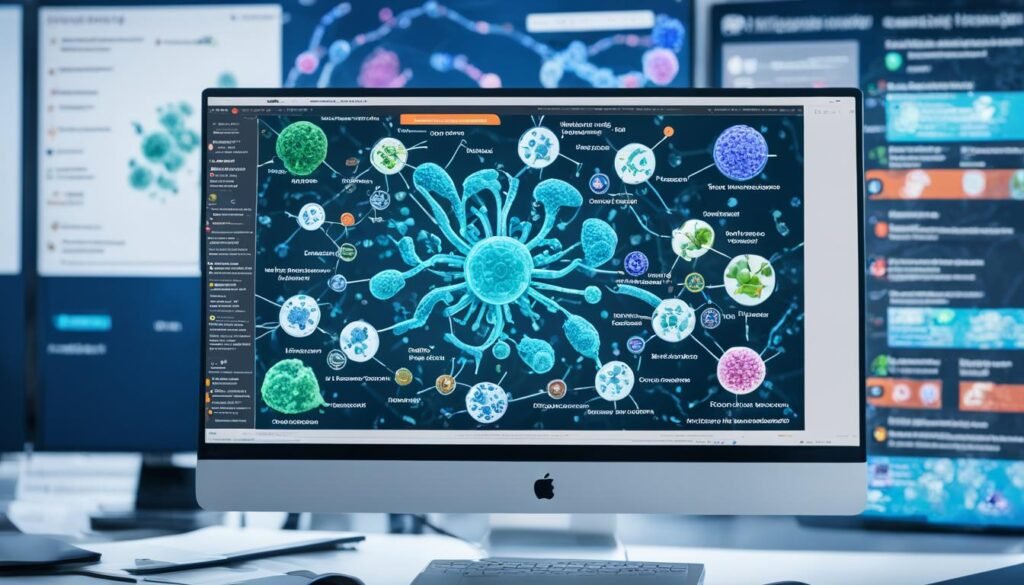
Taking a microbiology course online offers several benefits. These courses are often self-paced, allowing learners to study at their own convenience. They provide a structured syllabus that covers all the necessary coursework in microbiology. Online courses also provide virtual laboratories and interactive modules to enhance the learning experience. Learners have access to course materials and can engage with the course content at any time.
One of the key advantages of an online microbiology course is the flexibility it offers. Learners can study at their own pace, allowing them to balance their studies with other commitments such as work or family. This self-paced format empowers learners to take control of their learning journey and progress through the course material as they see fit.
Another benefit of online microbiology courses is the comprehensive syllabus they provide. These courses cover all the necessary coursework in microbiology, ensuring that learners gain a holistic understanding of the subject. The syllabus is carefully structured to build knowledge and skills progressively, ensuring that learners have a strong foundation in microbiology by the end of the course.
Virtual laboratories and interactive modules are integral components of online microbiology courses. These resources provide a hands-on learning experience, allowing learners to apply theoretical concepts in a practical setting. Virtual laboratories simulate real-world laboratory experiments, giving learners the opportunity to develop essential laboratory skills and techniques. Interactive modules engage learners through multimedia elements such as videos, quizzes, and interactive exercises, making the learning process more engaging and immersive.
Online courses also provide learners with convenient access to course materials. All the necessary resources, such as lecture notes, textbooks, and supplementary materials, are available online. This ensures that learners can access course materials whenever they need them, allowing for flexibility in studying and reviewing the content.
Overall, taking a microbiology course online offers flexibility, a structured syllabus, virtual laboratories, interactive modules, and convenient access to course materials. These benefits make online microbiology courses an excellent choice for individuals looking to enhance their knowledge in microbiology and pursue a career in related fields.
For an example of a virtual microbiology course, check out the image below:
Features of Online Microbiology Courses
| Benefits | Description |
|---|---|
| Self-Paced Learning | Learners can study at their own convenience, balancing their studies with other commitments. |
| Structured Syllabus | Courses provide a comprehensive syllabus covering all the necessary coursework in microbiology. |
| Virtual Laboratories | Learners gain practical experience through virtual laboratory simulations, developing essential skills and techniques. |
| Interactive Modules | Engaging multimedia elements in courses enhance the learning experience and make it more immersive. |
| Convenient Access to Course Materials | All necessary resources, including lecture notes and textbooks, are readily available online. |
Topics Covered in a Microbiology Online Course

Microbiology online courses cover a wide range of topics that delve into the fascinating world of microorganisms. Through these courses, learners gain comprehensive knowledge about various aspects of microbiology, including microbial growth, principles of microbiology, laboratory techniques, microbial physiology, immunology, and the classification of microorganisms.
One of the key areas of study in microbiology online courses is microbial growth. Students learn about the factors that influence the growth and reproduction of microorganisms, including environmental conditions, nutrient availability, and physical interactions. They explore different microbial growth patterns and gain an understanding of how microorganisms adapt and thrive in different ecological niches.
The principles of microbiology are also covered extensively in these courses. Students learn about the fundamental concepts and theories that form the foundation of microbiological research. They explore the diversity of microorganisms, their structures, functions, and the roles they play in various ecosystems.
Microbiology is a vast field with endless possibilities and discoveries waiting to be made. Through online courses, learners can unlock the mysteries of the microbial world and develop a deeper understanding of these remarkable organisms.
One of the unique features of microbiology online courses is the inclusion of laboratory techniques in a virtual environment. These courses provide learners with the opportunity to practice essential lab skills and techniques without the need for a physical lab. They engage with simulations and virtual experiments that mimic real-world lab settings, allowing them to apply theoretical concepts and develop practical expertise.
Microbial physiology is another important topic covered in these courses. Students delve into the biochemical and physiological processes that occur within microorganisms. They explore how microorganisms interact with their environment, acquire nutrients, and carry out vital metabolic functions. Understanding microbial physiology is crucial for various applications, such as developing antimicrobial strategies and studying microbial pathogenesis.
Immunology, the study of the immune system and its interactions with microorganisms, is also a significant area of focus in microbiology online courses. Students learn about the body’s defense mechanisms against pathogens, the process of immune response, and the role of vaccines and immunotherapies in preventing and treating infectious diseases.
Microbiology Lecture Components
In addition to practical learning experiences, microbiology online courses also incorporate lecture components. These lectures provide in-depth explanations of key concepts, theories, and research findings in the field of microbiology. They are delivered through video lectures, presentations, and interactive modules, ensuring that learners receive a comprehensive understanding of the subject matter.
Coursework may include assignments and exams to assess the learner’s understanding and application of microbiological concepts. These assessments allow students to demonstrate their knowledge and skills acquired throughout the course, providing valuable feedback and opportunities for growth.
The combination of laboratory work, lectures, and assessments ensures that learners get a well-rounded and hands-on learning experience in microbiology online courses.
| Topics Covered | Key Concepts |
|---|---|
| Microbial Growth | Factors influencing growth, growth patterns, adaptation |
| Principles of Microbiology | Diversity, structures, functions, ecological roles |
| Laboratory Techniques | Skills and techniques for working with microorganisms in a virtual lab |
| Microbial Physiology | Biochemical and physiological processes, metabolism, interaction with environment |
| Immunology | Immune system interactions, immune response, vaccines |
Prerequisites and Requirements for Microbiology Online Courses

When considering enrolling in a microbiology online course, you may wonder about the prerequisites and requirements. Rest assured that most microbiology online courses have flexible admission criteria and do not have strict prerequisites. However, having a basic understanding of biology or related subjects can be beneficial for a smoother learning experience.
Some courses may require you to enroll in a specific program or institution. This ensures that you have access to comprehensive course content and resources specifically designed for your learning journey. It also allows you to connect with a community of like-minded individuals who share your passion for microbiology.
All course materials and resources are provided online, giving you convenient 24/7 access to your course content. This means you can learn at your own pace and revisit the materials whenever you need a refresher. Whether you’re a working professional or a busy student, online courses offer the flexibility to fit learning into your schedule.
How to Choose the Best Microbiology Online Course
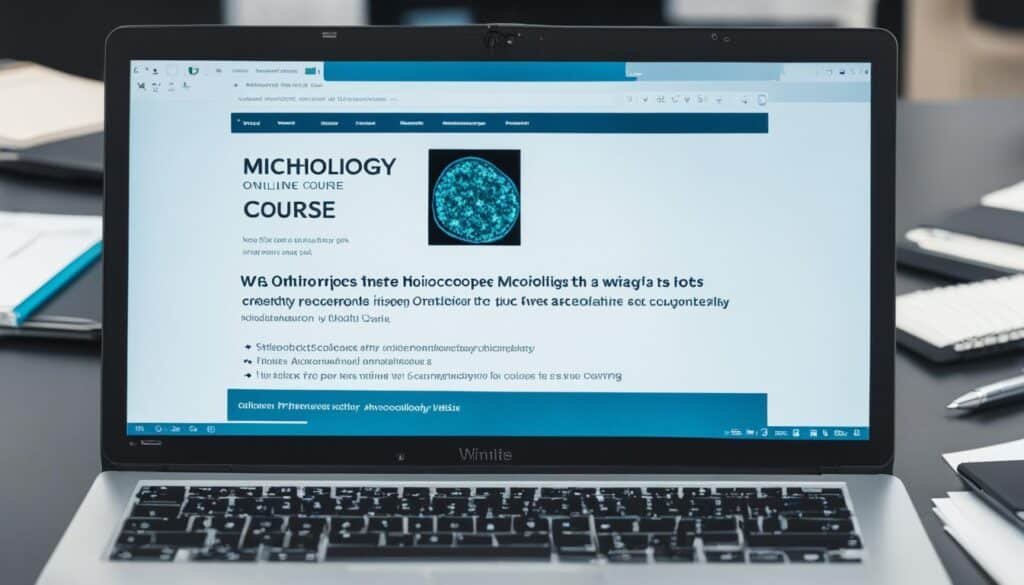
When seeking to expand your knowledge in microbiology, it is crucial to select an accredited online course that meets your educational and professional needs. Accreditation ensures that the course has undergone a rigorous review process and meets specific quality standards. Regionally accredited courses, in particular, are widely recognized and respected by employers. To make an informed decision, consider the following factors:
- Accreditation: Look for a microbiology online course that is accredited by a recognized institution or accreditation body. This ensures the credibility and quality of the course content.
- Course Content: Evaluate the syllabus and course descriptions to understand the topics covered. Ensure that the course aligns with your interests and goals in microbiology.
- Instructor Qualifications: Research the qualifications and expertise of the instructors teaching the course. Experienced and knowledgeable instructors can enhance your learning experience.
- Student Reviews: Read reviews or testimonials from previous students who have taken the course. Look for feedback on the course structure, materials, and overall learning experience.
By carefully considering these factors, you can choose a microbiology online course that provides high-quality education, practical skills, and a fulfilling learning experience. Take the time to investigate your options and select a course that aligns with your personal and professional aspirations.
| Accreditation | Course Content | Instructor Qualifications | Student Reviews |
|---|---|---|---|
| Ensures credibility and quality | Covers relevant topics | Experienced and knowledgeable instructors | Insights from previous students |
| Recognized by employers | Aligns with your interests and goals | Enhances the learning experience | Feedback on course structure and materials |
Career Opportunities in Microbiology

Microbiology offers a wide range of exciting career opportunities for individuals interested in the study of microorganisms. Graduates of microbiology online courses can pursue various professions in the field, including:
- Microbiologist: These professionals study microorganisms, conduct research, and analyze their impact on human health and the environment.
- Lab Supervisor: Lab supervisors oversee laboratory operations, ensuring safety protocols are followed, and managing laboratory procedures and staff.
- Bacteriologist: Bacteriologists study bacteria, conduct experiments, and develop ways to prevent and control bacterial infections.
- Mycologist: Mycologists specialize in the study of fungi, including their classification, characteristics, and roles in ecosystems and human health.
- Parasitologist: Parasitologists examine parasites and their interactions with hosts, studying their life cycles, prevention methods, and impacts on human and animal health.
Microbiology knowledge is valuable not only within the specialized field but also in various health professions such as:
- Nursing
- Medicine
- Veterinary sciences
Microbiology professionals also contribute significantly to other areas such as public health, virology, and research and development. With the increasing importance of understanding microorganisms and their effects on the world, the demand for skilled microbiologists in these fields is expected to grow in the coming years.
“Microbiologists have the unique opportunity to explore the microscopic world while contributing to advancements in healthcare, agriculture, and beyond.”
The Importance of Microbiology in Healthcare
Microbiology plays a critical role in healthcare. Understanding microorganisms and their impact on human disease is essential for diagnosing and treating illnesses.
Microbiology helps identify pathogens, develop antimicrobial strategies, and study immunology. It is also crucial for infection control and prevention in healthcare settings. Healthcare professionals with a strong background in microbiology are better equipped to handle infectious diseases and ensure patient safety.
By studying the intricate workings of microorganisms, healthcare professionals can gain insights into the mechanisms of human disease and develop effective treatment approaches. Microbiology enables the identification and characterization of disease-causing pathogens, such as bacteria, viruses, fungi, and parasites. This knowledge is vital for accurate diagnosis and the selection of appropriate antimicrobial therapies.
Furthermore, the field of microbiology plays a pivotal role in the development of antimicrobial strategies, including the discovery of new drugs and the implementation of effective infection control measures. The understanding of microbial physiology and the mechanisms of antimicrobial resistance is crucial for combating infectious diseases and preserving the efficacy of existing treatments.
Microbiology also contributes significantly to the study of immunology. By investigating the interactions between microorganisms and the immune system, scientists can develop vaccines and therapies to enhance immune responses against infectious agents. Additionally, microbiology provides insights into how pathogens evade the immune system, leading to the development of innovative immunomodulatory strategies.
In healthcare settings, the application of microbiology extends beyond diagnosis and treatment. Infection control and prevention rely heavily on the principles of microbiology to mitigate the spread of healthcare-associated infections. Understanding how microorganisms are transmitted and implementing appropriate hygiene practices and sterilization techniques are essential for ensuring patient safety and minimizing healthcare-associated risks.
A strong foundation in microbiology is crucial for healthcare professionals in various disciplines, including medicine, nursing, pharmacy, and public health. It equips them with the knowledge and skills necessary to identify and manage infectious diseases effectively. By staying updated on the latest advancements in microbiology, healthcare professionals can make informed decisions and contribute to the development of strategies to combat emerging infectious threats.
Overall, the importance of microbiology in healthcare cannot be overstated. It provides the foundation for understanding human disease, designing effective treatments, and implementing infection control measures. By embracing the principles of microbiology, healthcare professionals can enhance patient care, improve outcomes, and safeguard public health.
Microbiology Online Courses: Recommended Platforms and Resources
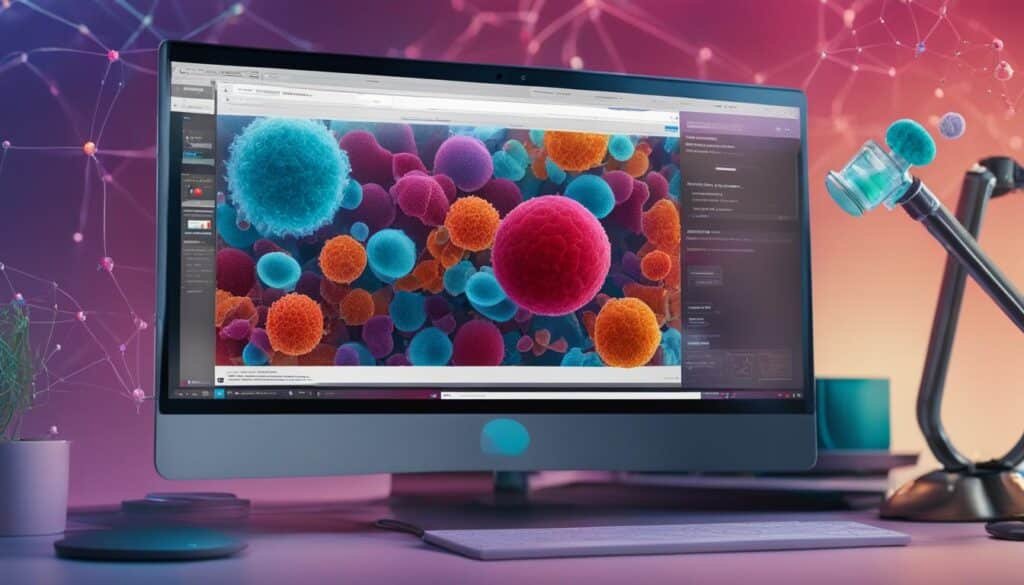
When it comes to pursuing microbiology online courses, there are numerous platforms and resources available to enhance your learning experience. Below, we have highlighted some of the most popular and reputable platforms and resources that offer comprehensive microbiology courses, access to course materials, and guidance from expert tutors and instructors.
Coursera
Coursera is a leading online learning platform that offers a wide range of microbiology courses. These courses are designed by top universities and institutions, ensuring high-quality content and expert instruction. Coursera’s courses often include interactive learning modules, quizzes, and hands-on assignments that help you apply your knowledge in practical ways. With Coursera, you can learn at your own pace and earn a certificate upon completion to showcase your expertise.
Lecturio
Lecturio is another reputable platform that provides comprehensive microbiology courses. Their courses are designed by experienced educators and cover various topics, including microbial growth, immunology, infection control, and more. Lecturio’s courses consist of engaging video lectures, supplementary materials, and quizzes to reinforce your understanding. The platform also offers a personalized learning experience, allowing you to track your progress and focus on areas where you need more practice.
Labster
If you’re looking for a more hands-on approach to learning microbiology, Labster is an excellent resource. Labster offers virtual laboratory simulations that allow you to practice various laboratory techniques and procedures. These simulations provide a realistic lab experience, giving you the opportunity to apply theoretical concepts in a practical setting. Labster’s interactive simulations are designed to enhance your understanding of microbiology and strengthen your practical skills.
McGraw-Hill
McGraw-Hill is a renowned publisher of educational resources, including textbooks and study materials for microbiology students. Their textbooks cover a wide range of microbiology topics and are widely used in academic institutions. McGraw-Hill’s resources provide comprehensive and up-to-date information, allowing you to delve deeper into the subject and supplement your online courses.
Online Tutoring Services
In addition to the course platforms mentioned above, you can also consider accessing online tutoring services. These services connect you with qualified tutors who can provide personalized guidance and support throughout your microbiology journey. Tutors can help clarify concepts, answer questions, and assist you in understanding complex topics. Seek tutors within your chosen course platform or explore independent tutoring services for individualized support.
By utilizing these recommended platforms and resources, you can enhance your learning experience and ensure your success in microbiology online courses. Take advantage of interactive modules, comprehensive course materials, and expert guidance from tutors to develop a strong foundation in microbiology and unlock exciting opportunities in healthcare, research, and more.
Conclusion
Microbiology is a fascinating field of study that provides valuable insights into the microscopic world of microorganisms. By taking an online microbiology course, learners can acquire the knowledge and skills necessary to comprehend the pivotal role that microorganisms play in healthcare, agriculture, and the environment. Whether individuals are aspiring microbiologists or simply seeking personal growth, online courses offer flexible and convenient opportunities for learning and upskilling. Start your microbiology journey today and unlock the endless possibilities that this captivating field has to offer.
Understanding microbiology is crucial, especially in healthcare settings. With the acquired knowledge, professionals can identify and combat pathogens effectively, develop innovative antimicrobial strategies, and contribute to the advancements in immunology. Additionally, having a strong foundation in microbiology enables healthcare practitioners to ensure infection control and prevention, thus promoting patient safety. Consequently, online microbiology courses empower individuals to thrive and make a lasting impact in the healthcare industry.
Embarking on an online microbiology course allows learners to explore a variety of strategies employed to study microorganisms. These courses delve into microbial growth, introduce fundamental principles in microbiology, provide hands-on experience with laboratory techniques, and delve into topics such as microbial physiology, immunology, and microorganism classification. By immersing themselves in comprehensive coursework and virtual laboratories, learners gain a comprehensive understanding of microbiology and its applications in diverse fields.
Also Refer : High School Course Of Study Guide & Tips
FAQs
Q: Is this a self-paced course?
A: Yes, this is a self-paced course, allowing you to study at your own convenience.
Q: What topics are covered in this course?
A: The topics covered in this course include microbiology with lab, biochemistry, eukaryote, general microbiology, bacterial metabolism, microscopy, aseptic techniques, fungal and protozoon morphology microbe stain.
Q: Will there be an online lab component?
A: Yes, this course includes an online lab component where you will enhance your understanding of microbiology through hands-on experience.
Q: Do I need a lab kit to take this course?
A: Yes, you will need a lab kit to complete the laboratory component of this course. It is essential for a comprehensive learning experience.
Q: Can I complete the course at my own pace?
A: Absolutely, you can complete the course at your own pace, allowing you to balance your study with other commitments.
Q: Will I have access to my online lab course within a specific period?
A: Yes, you will have access to your online lab course for the duration of the course, offering flexibility in completing the lab work.
Q: Will I receive an official transcript upon completing this course?
A: Yes, upon completing this course, you will receive an official transcript as a testament to your learning and achievement.
Q: What are the prerequisites for taking this course?
A: There are no specific prerequisites for taking this course, making it accessible to students with a keen interest in microbiology and related fields.
Q: Is the course proctored or administered in a specific way?
A: Yes, the course is proctored, ensuring academic integrity and authentication of your learning experience.
Q: What is the significance of taking this microbiology course for nursing school or health sciences?
A: This microbiology course offers essential knowledge and skills relevant to nursing school and health sciences, providing a solid foundation for understanding microorganisms and their impact on healthcare.

